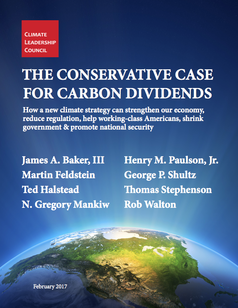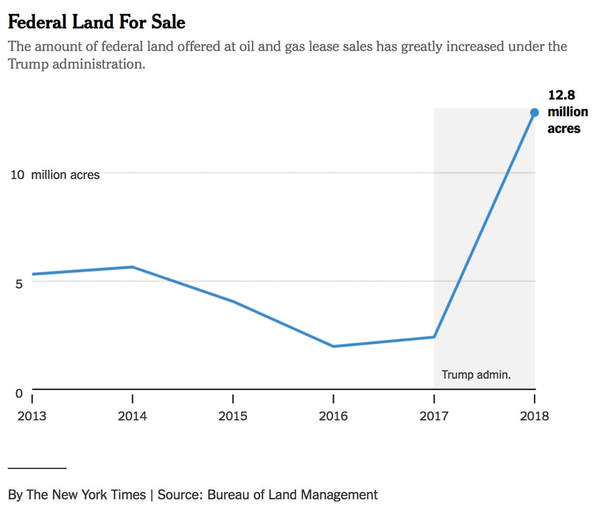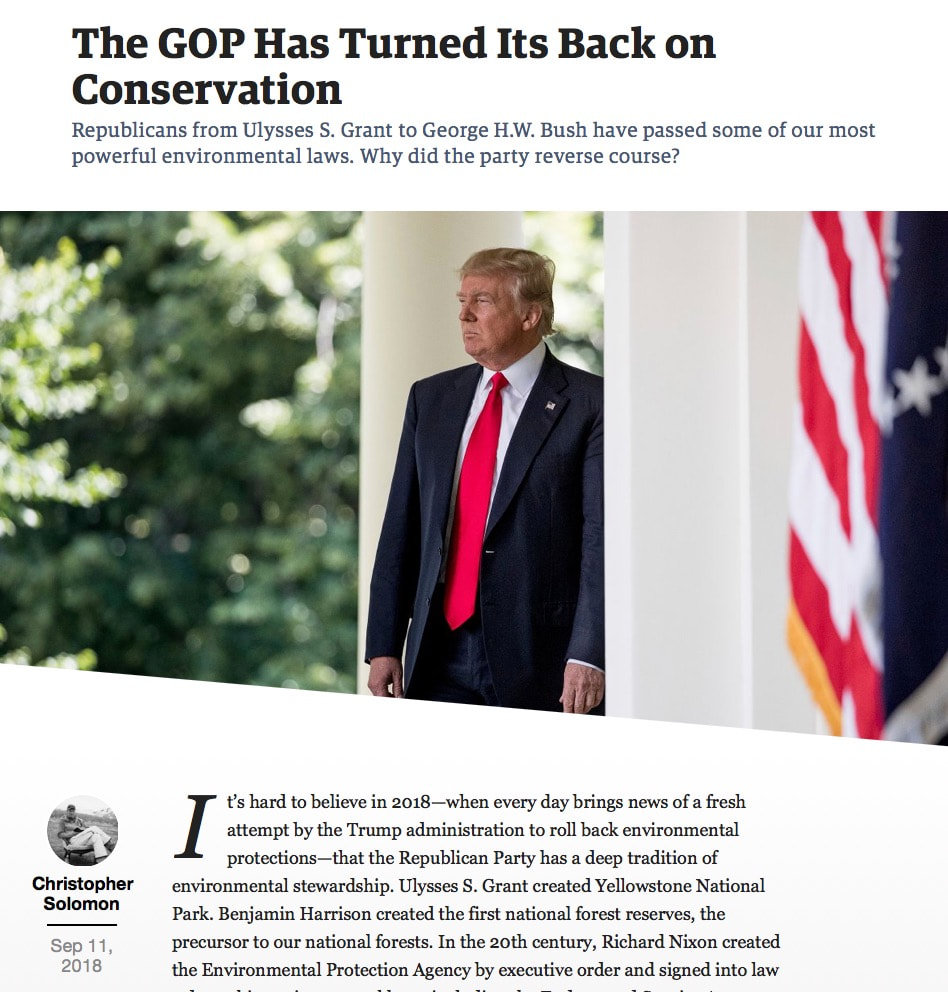 newbooksnetwork.com/james-m-turner-and-andrew-c-isenberg-the-republican-reversal-conservatives-and-the-environment-from-nixon-to-trump-harvard-up-2018/On November 20, the New Books network released a podcast of an interview Brian Hamilton, a Ph.D. candidate at the University of Wisconsin-Madison, conducted with James M. Turner and Andrew C. Isenberg. The abstract for the podcast is here: It wasn’t always this way. From the Theodore Roosevelt’s leadership on natural resource conservation to Richard Nixon’s creation of the Environmental Protection Agency and Ronald Reagan’s singing of the Montreal Protocol banning ozone-depleting chemicals, Republicans have a proud tradition of environmental stewardship. Why have they seemingly abandoned it? That question animates The Republican Reversal: Conservatives and the Environment from Nixon to Trump (Harvard University Press, 2018), a collaborative effort by acclaimed environmental historians James Morton Turner and Andrew C. Isenberg—who have produced an accompanying websitefor educators. They draw from the latest scholarship on the rise of postwar conservatism to explore how corporate interest groups, libertarian think tanks, evangelicalism, and the GOP power center’s shift southward and westward encouraged frustration with the broadly popular legislative achievements of the 1970s and resistance to mounting a similarly robust federal response to subsequent environmental problems. The authors explore the party’s shifting positions on the management of federal lands, the protection of air and water quality, and the mitigation of climate change. They observe how discourse prizing local control, prioritizing economic concerns, and questioning scientific expertise and international cooperation grew louder and louder and helped produce a political landscape where environmental issues are defined less by technical data and more by voters’ values. But party leaders’ anti-environmentalist rhetoric has often found them out of step with their constituents, and Republican administrations from Reagan to Trump have had to scale back their assaults on the environmental state. Click on this link to visit their website and download the podcast. Op-ed written by James Morton Turner and Andrew C. Isenberg
To hear President Trump tell it, he is “truly an environmentalist.” He says, “I want crystal clean water. I want the cleanest air on the planet.” But few Americans seem to believe him. The vast majority of voters indicate that the environment is very important (63%) or somewhat important (25%) to them in the mid-term elections. They strongly disapprove of Trump’s environmental policies.* Their disapproval is not surprising. The nation has been wracked by weather-related natural disasters over the past year: fires in California, hurricanes in Florida, North Carolina, and Hawaii. Many areas, such as Los Angeles, Chicago, and Philadelphia, still struggle to meet clean air standards. And drinking water emergencies remain recent memories in Flint, Michigan and Charleston, West Virginia. Yet the Trump administration has systematically worked to undo environmental commitments and policies that are popular not only with Democrats but with independents and moderate Republicans too. Trump hasn’t spent much time in office quibbling about environmental risks or the details of climate science. Instead, he just emphasizes that the economy and jobs come before public health and the environment. The Trump administration has initiated processes to: * Withdraw the United States from the Paris Climate Accord. * Replace the Obama administration’s Clean Power Plan, which aimed to reduce greenhouse gas emissions by one-third by 2030, with a plan that guarantees no reductions. * Freeze fuel-economy standards for new vehicles at 2020 levels through 2026. * Fast-track a permit for a massive new hard-rock mine in the pristine Bristol Bay watershed in Alaska. * Weaken a rule that requires power plants to reduce mercury emissions. * Open up unprecedented amounts of onshore and offshore public lands for fossil fuel production, including the Arctic National Wildlife Refuge and western national monuments in Utah (which his administration is trying to reduce in size by roughly 2 million acres). * Weaken the implementation of the Endangered Species Act, including protections for threatened species. * Repeal the 2015 Waters of the United States rule, which clarified the scope of the Clean Water Act. This is not the “back-to-basics” agenda the Trump campaign promised for the nation’s environmental laws and regulations. Instead, it is the most concerted and far-reaching effort to weaken the regulations that have protected the environment and human health since the 1970s, when the EPA was first created. This anti-regulatory blitzkrieg marks the culmination of conservative Republicans’ frustrations with the EPA that have been building since Ronald Reagan arrived in the White House in 1981. Much like Trump, Reagan set out to roll-back the nation’s environmental policies when he appointed James Watt to lead the Interior department and Anne Gorsuch to lead the EPA. Despite Reagan’s blustery anti-environmental rhetoric and his conservative appointees, his administration’s efforts to weaken the Clean Air Act, the Clean Water Act, and other core environmental policies largely failed. But where Reagan largely failed, Trump is better positioned to succeed. What explains the difference? First, since the 1990s, congressional action on the environment has collapsed in gridlock. That has made administrative initiatives more important. Much of what Trump is undoing are administrative initiatives that the Clinton and Obama administrations put into place through rules, regulations, and initiatives that ran around rather than through Congress. Second, in the 1980s, a Democratic Congress watchdogged Reagan’s deregulatory agenda at every step. Reagan’s efforts to rollback key environmental laws ran up hard against a Congress full of Democrats and moderate Republicans that knew how important the nation’s core environmental laws had been in lessening the burdens of pollution and improving public health. Today, however, a Republican-controlled Congress has largely cheered the Trump administration onwards. As a result, the Trump administration has been free to aggressively pursue regulatory reforms. It has tilted advisory boards in favor of industry appointees and has slashed EPA staff. Which EPA division has lost the most staffers? The Office of Enforcement and Compliance. To date, Trump has pursued his anti-environmental agenda mainly through administrative actions. In the months ahead, many of these initiatives are likely to be stalled or overturned in the courts. That won’t bring a close to Trump’s anti-environmental agenda. Instead, Trump will likely look to Congress to change the underlying laws to bring his deregulatory agenda to full fruition. Although that strategy did not work for Reagan, it could for Trump, especially if Republicans hold onto majorities in Congress next week. If that happens, expect things to get worse yet. The ill consequences for our nation’s environmental and public health laws will be even longer lasting and more consequential than what we’ve seen so far. * Based on fall 2018 polling data from Roper and Gallup. In The Republican Reversal, we write: "In the 1980s, as conservatives gravitated toward the Republican Party and set in motion what would become the Republican reversal, they gave new life to an old theme in American history: the nation’s freedom depended on aggressively developing its abundant, God-given natural resources, not exercising conservation and restraint. Such a vision of abundance was a potent tonic for the emerging coalition that helped propel the Republican Party’s conservative ascendancy in the last quarter of the twentieth century."
During the Obama administration's second term, the federal government reduced offerings of public lands for oil and gas leasing and it began to tighten regulations on fossil fuel development as it set the stage for a transition toward a clean energy economy. In contrast, the Trump administration has given new life to western visions of abundance. In the past two years, it has moved swiftly to open up the public lands for resource development, mostly for oil and gas development. In an October 27 article, Eric Lipton and Hiroko Tabuchi of The New York Times detail the Trump administration's campaign to throw open the public lands to oil and gas developers. At every step of the process, the Trump administration has weakened permitting requirements and provisions for environmental and public review in an effort to expedite leasing. As Lipton and Tabuchi explain, the push for oil and gas on public lands is working: the administration has more than doubled the amount land available for leasing and onshore oil production on federal lands is on track to outpace any other year on record in 2018. But the costs will be significant: flaring natural gas is worsening local air pollution, the oil and gas industry uses large amounts of water also needed for ranching and agriculture, and rapid development poses threats for vulnerable species such as the sage grouse. Click the graph below to read their coverage. In September 2018, Chris Solomon interviewed us about The Republican Reversal for Outside Online. Read the interview at the link below.
 Author: James Morton Turner On July 19, 2018, the House passed an anti-carbon tax resolution. Considering the party’s position on climate change and its opposition to taxes, that came as little surprise. Since 2013, conservative interest groups such as the Koch-funded group Americans for Prosperity, had urged Republicans to sign a “No Climate Tax” pledge. What has been more surprising have been several Republican-led initiatives in support of a carbon tax. In February 2017, old-guard Republicans, including former Secretary of State George P. Shultz (Reagan administration), Secretary of the Treasurer James Baker (Reagan administration) and Henry Paulson (George W. Bush administration), called for tax and dividend approach to carbon dioxide regulation where carbon is taxed, but the revenue is rebated back to businesses and citizens. In June 2018, a newly formed political action committee, Americans for Carbon Dividends, co-chaired by two former U.S. senators with strong ties to the oil and gas industry began laying the groundwork for a campaign in support of tax and dividend carbon legislation, in exchange for rolling back other energy and environmental regulations. On July 23, 2018, Representative Carlos Cubelo (R-Florida) introduced a carbon tax, the revenues of which would be used to support infrastructure improvement. As we explain in our book, The Republican Reversal, moderate Republicans championing market-based strategies have played a pivotal role in key moments of American environmental policy, including addressing acid rain through the Clean Air Act amendments of 1990. These events suggest that some Republicans recognize the need to forge a strategy on climate change, both to address an urgent problem and to strengthen the party’s political relevancy with younger voters. But those gains should not come at the expense of giving up other protections for the environment and human health and protecting polluters from climate change liability, as Lee Wasserman and David Kaiser have argued. If such legislation is ever to gain momentum, however, some regulatory relief will likely be necessary to oil the gears of compromise. |
AuthorWrite something about yourself. No need to be fancy, just an overview. Archives
April 2020
Categories |




 RSS Feed
RSS Feed